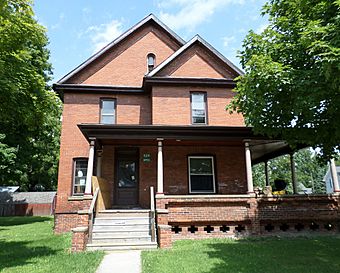Julius Frieseke House facts for kids
Quick facts for kids |
|
|
Julius Frieseke House
|
|
 |
|
| Location | 529 Corunna Ave., Owosso, Michigan |
|---|---|
| Area | less than one acre |
| Built | c. 1897 |
| Architectural style | Queen Anne |
| NRHP reference No. | 90000574 |
| Added to NRHP | April 5, 1990 |
The Julius Frieseke House is a cool old house located at 529 Corunna Avenue in Owosso, Michigan. It's a special building because it was added to the National Register of Historic Places in 1990. This means it's recognized as an important historical place!
Contents
The Frieseke Family Story
Julius Frieseke was born in Germany in 1842. When he was about 16 years old, he moved to Owosso, Michigan, with his parents and his brother, Herman.
From Brickyard Workers to Owners
Both Julius and Herman started working at the Shattuck brickyard in Owosso. Later, they moved to Ypsilanti, Michigan to work at another brickyard there. During the Civil War, both brothers served in the Union army.
After the war ended, they came back to Owosso. Soon, they bought the Shattuck brickyard where they first worked! They renamed it the J. & H. Frieseke brickyard. Their business started small, but it grew a lot. By 1891, they had 25 workers and made two to three million bricks every year. That's a lot of bricks!
Building a New Home
Around 1897, Julius Frieseke built a brand new brick house. This new house replaced his older wooden house, which is still standing nearby. Julius lived in this beautiful brick house until he passed away in 1920.
What Does the House Look Like?
The Julius Frieseke House is a two-and-a-half-story building. It's built in the Queen Anne style, which was popular for homes back then. The house is made of dark red bricks. Guess what? These bricks were made right in the Frieseke family's own brickyard!
Special Features of the House
The outside of the house has simple but nice details. It has a cool porch that wraps around the front, with round columns called Tuscan columns. The windows are tall and narrow, with a single pane of glass on the top and bottom. They have a rounded shape at the top, especially the windows in the gables (the triangular parts of the roof).

